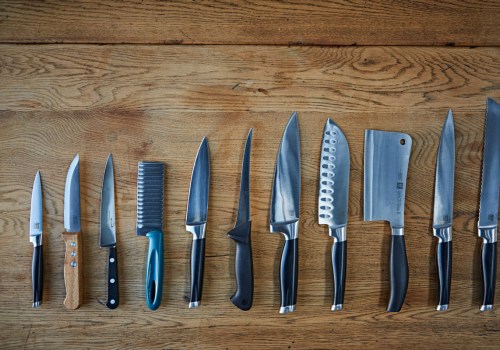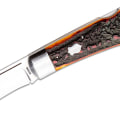For anyone looking for the perfect way to sharpen their knives, oil stones are the ideal choice. Oil stones are the go-to tool for many knife sharpeners, offering an effective and efficient method of sharpening knives. With their simple and straightforward design, oil stones make sharpening knives a breeze. In this article, we'll be exploring the benefits of using oil stones for knife sharpening, as well as some tips and tricks to help you get the most out of them. Oil stones are a type of sharpening stone that works by breaking down metal particles as you sharpen a knife blade.
They are made of natural materials such as Novaculite, Silicon Carbide, or Aluminum Oxide, which are bound together with a binder. The stones are then cut into different shapes and sizes, depending on their intended use. Oil stones are usually divided into two categories: coarse stones and fine stones. Coarse stones are used to remove large amounts of metal from the blade, while fine stones are used to refine the edge and remove any burrs.
The coarseness of the stone is measured in microns, with finer stones having a lower micron rating. When using an oil stone to sharpen a knife, it is important to use the correct technique. Start by coating the stone with a lubricant such as oil or water. This helps reduce friction during sharpening and prevents the blade from becoming too hot. Hold the blade at a 20-degree angle against the stone and move it in a circular motion until the desired edge is achieved.
After sharpening, wipe off any excess lubricant from the blade and stone with a clean cloth. In addition to oil stones, there are other types of sharpening stones available. Waterstones are made from aluminum oxide and are usually softer than oil stones. They require less lubricant and tend to produce a finer edge on knives. Diamond stones are harder than both oil and waterstones and can be used to sharpen even the toughest blades.
Sharpening stones
can be used to maintain the edge on any type of knife and can help keep it in top condition for years to come.With proper care and maintenance, an oil stone can last for many years without needing to be replaced.
Alternatives to Oil Stones
In addition to oil stones, there are other types of sharpening stones available.Waterstones
are made from aluminum oxide and are usually softer than oil stones.Diamond stones
are harder than both oil and waterstones and can be used to sharpen even the toughest blades.Using an Oil Stone
When using an oil stone to sharpen a knife, it is important to use the correct technique. Make sure to use light strokes and use both sides of the stone to sharpen the knife evenly.When finished, wipe off any excess oil or water from the blade and stone. It is important to choose an oil stone with the right grit for the knife you are sharpening. A finer grit will produce a sharper edge but will take longer to sharpen. If a knife is very dull, it may be necessary to start with a coarse grit and then progress to finer grits for a polished edge. For best results, use honing oil when sharpening an oil stone. Honing oil helps keep the stone clean and prevents clogging.
It also helps protect the blade from rust and corrosion. Make sure to clean and dry the stone after each use.
Types of Oil Stones
Oil stones are one of the most popular tools for sharpening knives. They come in a variety of shapes, sizes, and grits, allowing for precise and effective sharpening on all types of knives. The three most popular types of oil stones are Novaculite, Silicon Carbide, and Aluminum Oxide. Novaculite is a sedimentary rock composed of quartz, feldspar, and mica.It is a very hard and dense material, making it an ideal sharpening stone. Silicon Carbide is a man-made material that is both hard and durable. It is often used for honing and polishing blades. It is also less expensive than other types of stones. Aluminum Oxide is a synthetic material that is very hard and can be used for honing and sharpening all types of knives. It is a very popular choice because it is relatively inexpensive. No matter which type of oil stone you choose, it's important to use the right amount of oil to protect the stone from wear and tear.
Also, be sure to clean the stone after each use to prevent clogging. Oil stones are one of the most popular tools for sharpening knives. They are made from natural materials such as Novaculite, Silicon Carbide, and Aluminum Oxide and come in a variety of shapes, sizes, and grits. Using an oil stone correctly and with proper care and maintenance can help ensure that it lasts for many years without needing to be replaced. Alternatives to oil stones are also available, depending on what type of knife you are looking to sharpen.






Leave Reply